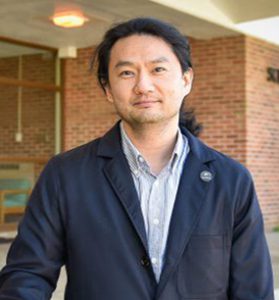Outreach event “Health Starts at Home” will be held today, 9 a.m.- 1 p.m. in Nursing Building
 GRAMBLING, La. – Oct. 13, 2021 – Dr. Paul Kim, an associate professor of biological sciences at Grambling State University, is on the frontline of research related to the coronavirus and its impact on underserved communities.
GRAMBLING, La. – Oct. 13, 2021 – Dr. Paul Kim, an associate professor of biological sciences at Grambling State University, is on the frontline of research related to the coronavirus and its impact on underserved communities.
“We’re working on two projects to respond to COVID-19,” he said, explaining that one focuses on tracking disease through wastewater from sewer systems while the other involves sequencing the virus to better understand how it evolves and spreads.
Two undergraduate students are assisting with the work while faculty from the School of Social Work are helping with outreach. The first outreach event is the “Health Starts at Home” forum that will be held today from 9 a.m. to 1 p.m. in the Nursing Building.
The Research
The first project, which began in April 2021, involves monitoring the level of coronavirus in wastewater to get a sense of how much COVID-19 is in the community. The second project involves a collaboration with LSU Health Shreveport and Louisiana Tech to form one of the four Rockefeller Regional Accelerators for Genomic Surveillance.
Genomic sequencing allows health officials and scientists to study prolonged outbreaks, understand behaviors that spread COVID-19, and map coronavirus clusters.
The other regional accelerators are the Broad Institute of MIT/Harvard, University of Wisconsin-Madison, and University of Florida/Central Florida.
“As we’ve all seen with Delta, the coronavirus mutates and can create variants that pose a risk to public health,” Kim said. “By sequencing the genome of viruses collected from patients, we have a chance to detect the next variant as it emerges, before it spreads out of control. “
The goal of the accelerator is to increase sequencing volume and representation in the southern U.S. because these states tend to lag behind other regions in viral sequencing, Kim explained.
“We believe that the same factors driving other health disparities are at work here which is why we’re focused on equitable sequencing,” he said.
The Findings
“We find very low levels of SARS-CoV-2 in the city of Grambling wastewater,” Kim said. “Often the level is below our limit of detection.”
This was also the case at GSU during the summer when few students were on campus. However, since the start of the fall semester, there has been an increase and this increase correlates with the number of cases in the student health center.
“Over the past two weeks, we’re seeing a decline in viral load that mirrors the decline in cases in Louisiana and throughout the U.S. – with the exception of a few states,” Kim said. “We have partnered with free clinics and campus clinics to sequence SARS-CoV-2 from their patient specimens and to share that genomic data with researchers through a database called GISAID EpiCoV.”
The result has been more data that can be used to monitor the coronavirus.
“As of today, there are 112 viral sequences from Lincoln Parish shared on GISAID since the start of the pandemic. Our group is responsible for 93 of those,” he said. “That’s significant considering that we started in late July 2021. Most of those sequences are from the LSUHS Emerging Viral Threat lab but recently GSU started sequencing the coronavirus in my lab and we now have sequences from 18 specimens uploaded to EpiCoV.”
The Importance of the Work
“Wastewater-based epidemiology may be a useful tool for tracking infectious disease, particularly COVID-19 because many cases are asymptomatic or so mild as to go unreported.” Kim said. “It’s data that our campus administration can use to make informed decisions.”
He said that “sequencing the virus helps us to understand the disease, how it evolves, and spreads. Our work helps ensure that the virus is being sequenced from a population that reflects the ethnic and geographic diversity of the U.S.”
Mathematical models have estimated that scientists need to sequence 5% of positive cases to detect an emerging variant early.
“Before our work, only 0.43% of cases were being sequenced in Lincoln Parish,” Kim said. “Now it’s approximately 5.2%. We’ve accomplished this through a grassroots effort involving free clinics and small university clinics and labs with a modest budget. We think that this can serve as a model for other communities to start their own genomic surveillance programs.”
He said a major motivation for him is to involve GSU faculty and students in this work.
“As an underserved community, it’s one thing for others to come and serve us, but another thing for us to have an opportunity to do the research and the work ourselves,” Kim said. “I have two undergraduate students (Lescia Valmond, Madgrie Francis) working in my lab on these projects. Dr. Elise Reed and Dr. Gayberyl Wesley in the School of Social Work are developing the outreach component of the Regional Accelerator.”
This morning’s “Health Starts at Home” outreach event is the first of many.
“We’ll be taking lessons from this event to do more events in the community outside GSU to increase awareness, promote vaccination, and collect specimens for sequencing,” Kim said.

